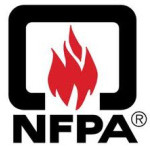- Industry: Fire safety
- Number of terms: 98780
- Number of blossaries: 0
- Company Profile:
Established in 1896, NFPA's mission is to reduce the worldwide burden of fire and other hazards on the quality of life by providing and advocating consensus codes and standards, research, training, and education.
Fittings used to connect hose assemblies to piping and valves without the use of tools.
Industry:Fire safety
Fitting attached to the vessel used to secure an anchor rode or other line to the vessel.
Industry:Fire safety
Fires that, if unchecked, will continue to grow over the design interval time.
Industry:Fire safety
Fires that are not expected to grow beyond a predictable maximum heat release rate.
Industry:Fire safety
Fires in flammable liquids, combustible liquids, petroleum greases, tars, oils, oil-based paints, solvents, lacquers, alcohols, and flammable gases.
Industry:Fire safety
Fire-induced faults on circuits routed through a common fire area that are assumed to occur simultaneously and have a current magnitude below the trip point for the individual circuits and the sum of the currents generated by the simultaneous occurrence of such faults could trip the main circuit breaker and cause the loss of a safe shutdown power supply.
Industry:Fire safety
Fire-fighting operations involving the application of extinguishing agents to reduce the buildup of heat released from a fire without applying the agent directly onto the burning fuel.
Industry:Fire safety
Fire-fighting operations involving the application of extinguishing agents directly onto the burning fuel.
Industry:Fire safety
Fire-fighting foam, within the scope of this standard, is a stable aggregation of small bubbles of lower density than oil or water that exhibits a tenacity for covering horizontal surfaces. Air foam is made by mixing air into a water solution, containing a foam concentrate, by means of suitably designed equipment. It flows freely over a burning liquid surface and forms a tough, air-excluding, continuous blanket that seals volatile combustible vapors from access to air. It resists disruption from wind and draft or heat and flame attack and is capable of resealing in case of mechanical rupture. Fire-fighting foams retain these properties for relatively long periods of time.
Industry:Fire safety
Fire scenario(s) in which one or more of the inputs to the fire modeling calculation (e.g., heat release rate, initiation location, or ventilation rate) are varied to the point that the performance criterion is not met. The intent of this scenario(s) is to determine that there is a reasonable margin between the expected fire scenario conditions and the point of failure.
Industry:Fire safety
